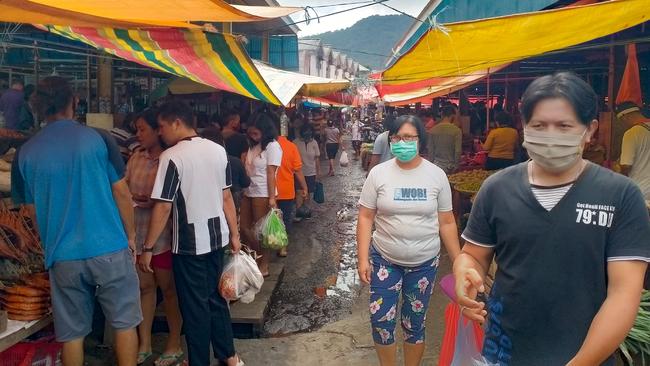Coronavirus: PM to push global end to wet markets as ‘extreme’ markets flourish in Indonesia
Scott Morrison wants wildlife wet markets selling slaughtered bats alongside other exotic animal meats stamped out worldwide.
Prime Minister Scott Morrison says he is concerned about all wildlife wet markets across the globe, as fears rise about the operation of such markets in Indonesia.
The Australian revealed on Wednesday that wet markets selling slaughtered bats alongside other exotic animal meats continue to operate in Indonesia under conditions similar to those in China that have led to the worst pandemic in a century, despite urgent warnings about the risks to human health.
The Prime Minister said he would pursue an end to wildlife wet markets across the globe before the World Health Assembly meets next month and has secured the support of European Commission President Ursula von der Leyen.
“My position has never been directed only to one country. It has been a broad position. These markets exist in many places, just as the next pandemic could come from any country, any country in the world,” he said in Canberra.
“It could occur in any part of the globe, and it is important that we learn the lessons of how this pandemic started, so we can move on any future pandemic, wherever it starts.
“This is why it is an important initiative, and one that I believe has support to occur at the right time. In Europe at the moment, I was speaking to the president of the European Commission last night. We discussed this issue. The Europeans are bringing forward a motion on this matter at the world health assembly. I think it is a very good motion.”
Wuhan wet market link
The COVID-19 virus that has now killed more than 211,000 people and infected more than three million is believed to have originated in horseshoe bats in China and been transmitted through an intermediary animal host to humans at a wildlife wet market in Wuhan.
China has had a temporary ban on wildlife sales since it acknowledged the scale of the outbreak in late January, just as it imposed restrictions after the 2002 SARS outbreak, which was also transmitted via bats and an intermediary animal host at a Chinese wet market. But Indonesian authorities have brushed off concerns over such markets — which also operate in other Southeast Asian and African countries — even as Australia leads an international campaign to strictly regulate and phase out the trade.

Indonesia’s COVID-19 taskforce spokesman Achmad Yurianto told The Australian on Tuesday “the decision to discipline or close these ‘extreme’ markets should come from local authorities, not from us”. “Ideally extreme (wildlife wet) markets would be shut down,” said Siti Nadia Tarmizi, the Health Ministry’s zoonotic disease director, but the ministry’s emphasis was on defeating human-to-human transmission of the virus.
Shoppers thronged North Sulawesi’s notorious Tomohon “extreme meat” market on the weekend, where rows of bat carcasses were lined up on bloodied butchers’ tables next to charred dog bodies and pig heads.
Nearby, eviscerated pythons hung suspended from meat hooks while other vendors sold whole cooked rats on sticks.
One bat seller, Cibey, told The Australian he was having trouble securing his usual supply because the hunting area had been “badly hit by the pandemic”. “We are concerned about health but we must continue to show up for work. What else can we do except sell meat as usual?” he said.

In Jakarta’s Jatinegara market, live bats — slaughtered for their hearts, which are considered good for asthmatics — are displayed in cages wedged against others holding known coronavirus vector species such as illegally caught civets, monkeys and snakes.
Australian Chief Veterinary Officer Mark Schipp says wildlife and wildlife wet markets pose significant public health risks, given that six pandemic or large-scale emerging diseases since 1980 — AIDS, SARS, swine flu, MERS, Ebola and COVID-19 — originated in wild animals.
“When you bring wildlife into a market like that, they’re stressed and are going to shed more virus in bodily fluids; faeces, blood, urine,’’ Dr Schipp said. “Typically they wash down once or even more a day, which aerosolises the virus and creates the opportunity for it to spread between species.
“When they’re stacked on top of each other there is faeces, blood, urine falling on one another.”
Even bats slaughtered elsewhere then brought to market posed health risks, given that bat-borne diseases Nipah virus, lyssavirus and rabies could pass directly to humans, Dr Schipp said.

Agriculture Minister David Littleproud lobbied G20 counterparts last week to back Australia’s plan to phase out wildlife wet markets, calling them a “biosecurity and human health risk”.
The government has submitted recommendations to the World Health Organisation for rigid regulation of the markets ahead of its world assembly next month, at which resolutions will be passed aimed at controlling the pandemic and preventing future outbreaks.
Groups such as the Jakarta Animal Aid Network have lobbied for years to close down Indonesia’s wildlife markets, arguing that the wildlife is captured illegally and there is no food security or cultural justification for them.
Tomohon local government chief health officer Isye Liuw is worried about the public health risks and has reduced the Tomohon market’s operating hours and begun discouraging consumption of bat meat, known as paniki.
“Of course we are concerned but we cannot close them because people are still going there to buy their daily needs,” Dr Isye said.
Dr Schipp, who also heads the assembly for the World Organisation for Animal Health, said trying to eradicate the markets would only push them underground but authorities could no longer take a “siloed approach” to the issue.
“We need a ‘one health’ approach that recognises this disease has arisen out of a spill-over from animals and that all disciplines — economics, epidemiology, environmental, vet science and human health — will contribute to a solution,” he said.
“If countries want to argue this is a food security and protein issue then we would argue it could be better regulated and separated to address the zoonotic risk.
“But there are many occasions where there is no good food security reason for it, it is simply a preference or prestige product.”
Additional reporting: Chandni Vasandani, Agung Maupa







To join the conversation, please log in. Don't have an account? Register
Join the conversation, you are commenting as Logout